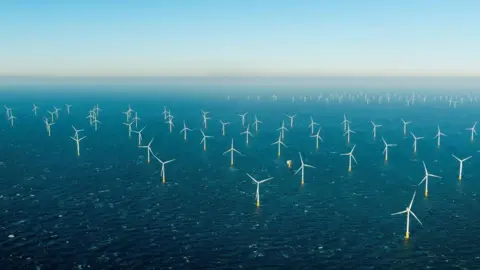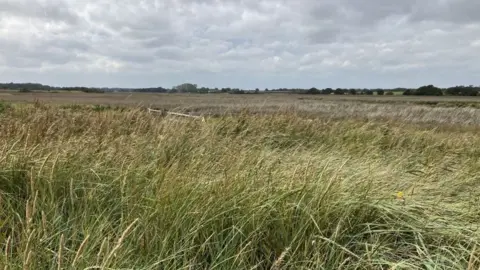LionLink: Suffolk County Council criticises power cable scheme
 Charlotte Webb/National Grid
Charlotte Webb/National GridPlans for a huge electricity cable to come onshore near protected sites were "wholly unacceptable", a council said.
The power line, called LionLink, would connect offshore wind farms in the North Sea and transfer electricity between the UK and Netherlands.
But Suffolk County Council said bringing the project onshore at Southwold or Walberswick would affect parts of the picturesque coastline.
National Grid said it would "value feedback" while developing plans.
The government has said the subsea LionLink would carry 1.8GW of electricity, giving it the largest capacity of any cross-border electricity line in the world.
The joint venture between the UK and Dutch governments will help boost energy security, it was said at the Ostend summit in April, where the deal was announced.
It comes as the UK must also find more ways to generate clean energy to help reach its net zero target by 2050.

However, Areas of Outstanding Natural Beauty (AONB), a Special Area of Conservation (SAC) and Site of Special Scientific Interest (SSI) would all suffer under the proposal, the county council said.
Deputy leader Richard Rout (Conservative), who is also the cabinet member for finance and environment, said: "The impact of LionLink on our local communities, businesses and natural environment would be substantial.
"It's close to people's homes, access to the road network is challenging and is located in the AONB on the borders of Minsmere.
"Neither can we support the proposed cable route, which is a considerable distance from the substation at Friston that it would need to connect to."
Mr Rout added the construction would also disrupt highly sensitive areas along the Wang River and Blyth River valleys.
Additionally, the council wanted the National Grid to co-ordinate its LionLink project with its Sea Link scheme, between Suffolk and Kent, so they could be examined together.
National Grid Ventures, which was developing the scheme with Dutch electricity network TenneT, was expected to submit a planning application in 2025, which could lead to it being switched on in the 2030s.
In a statement, it said it wanted people to continue providing feedback.
"LionLink will help to make the nation's energy more secure and bring clean, green energy to our shores," it said.
"Last year's consultation provided valuable insight and has enabled us to refine our proposals."

Follow East of England news on Facebook, Instagram and X. Got a story? Email [email protected] or WhatsApp us on 0800 169 1830
